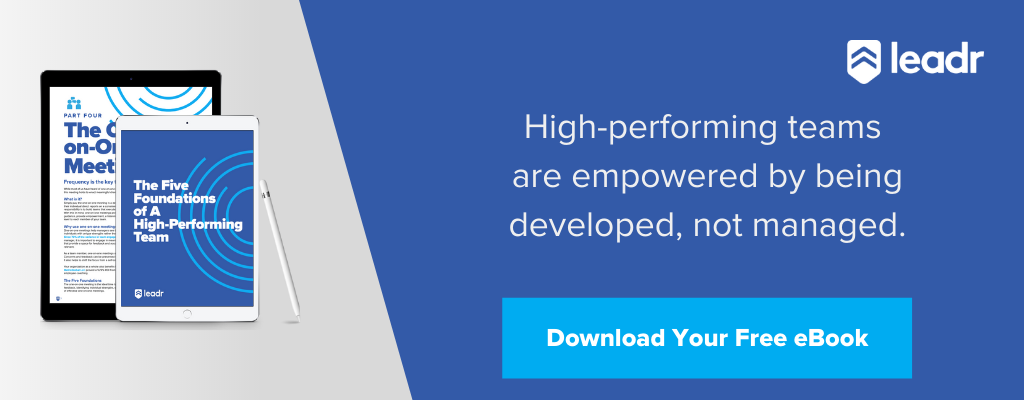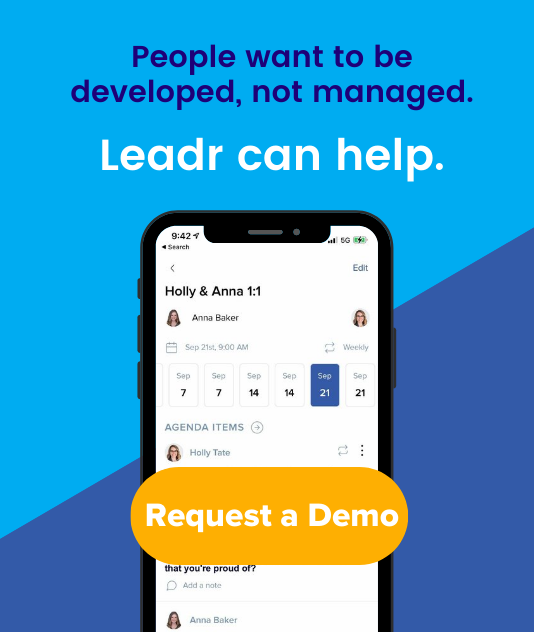Three Ways Investing In Your Staff Benefits Organizational Success
Seth Godin once said that “Teaching leadership involves helping people seek out responsibility.” We love that perspective because as a leader, your job is also a teacher. And it’s the most critical part of your job.
“Without teachers telling me I was a good writer or having a boss who believed in my ability, I likely would have never landed in my current role.”
This storyline is true for so many of us.
Just as school teachers constantly interact with students who have so much potential, as a supervisor or a leader in an organization, your team is full of people who have unrealized potential. Every member on your team has a way that they can grow if they could see the path towards that growth.
It’s their responsibility to do the work to grow, but it’s your responsibility to call out where you see their strengths and help them start.
Although it takes time and intentional work, you’ll never regret investing in the process of identifying and celebrating your team’s strengths and developing their weaknesses. Not only does this make for a stronger, more efficient, and more connected team, but it also enables you to do better work for your customers, to strengthen and nurture your organization’s culture of inclusivity and diversity, streamline processes, and harness creativity and passion drawn from using your unique strengths and skills at work.
Here are three big reasons why spending time developing your team matters:
1. It creates more fulfillment at work.
Developing others creates more fulfillment in the work you’re doing, for both the person doing the mentoring and the person being mentored.
The workplace has changed, especially in the last year. According to numerous workplace studies over the years, like this one from HBR, today’s employees expect more than just pay or title, they seek careers where they can learn, grow, be challenged, and be valued for the ideas they bring to the table.
When someone develops you at work and opens up space for you to do work that you’re great at, and that maximizes what you can contribute because you’re constantly using your strengths, you can’t help but be happier at work. You won’t want to leave.
According to this recent study on employee retention in the World Economic Forum, which surveyed 30,000 people across 31 countries, 41% of employees plan to leave their current jobs this year. Why? The top three reasons were lack of connectedness to their organization's mission, a lack of forward momentum perceived by employees, and a lack of commitment to employee development. If for no other reason, investing in the skills of your team helps boost retention, which is something every leader is on board with.
But as you shift your mindset from projects to people, you as a manager will find more fulfillment in your work too. People matter and they’re at the heart of your organization. Developing your staff and helping them start on the path towards leadership is one of the most rewarding things you can take on.
Research from Gallup shows that 70% of the variance in a team's engagement is related to their management. They note that “Managers create the conditions that promote the behaviors of engaged employees (or just the opposite) with the relationships they establish. The manager is either an engagement-creating coach or an engagement-destroying boss, but both relationships affect employee behavior.”
As a manager, it’s your responsibility - and should be your joy, too - to create an environment where your team comes to work and knows it’s a place they can and should grow.
2. Inclusivity becomes a flourishing part of your culture.
Inclusion at work is all about how your team members feel accepted and valued for what they uniquely bring to the table. Utilizing personality assessments can be a great starting place for recognizing your team’s strengths and having a common language to discuss shortcomings, but it shouldn’t stop there. Keep having those conversations, both one on one and as a team, about how inclusion fosters mutual respect and appreciation for who a team member is - not just in the context of their role, but also in the big picture of the entire organization.
When you recognize the diversity of your team, you begin to value their strengths more. What one person can’t do is something someone else can do really well. It builds teamwork, shared responsibility and accountability. It also leads to a sense of dignity for each team member.
Allowing team members to step in where they’re motivated and talented is also better for your organization. Don’t limit your team’s exposure to tasks just because they’re outside of their job description. Hearing from all of the different perspectives on your team will allow for the greatest possible outcomes for your organization as you consider issues from all angles. This is foundational to your culture as an organization.
Leadr’s first customer, Pastor Dan Cogswell, puts it perfectly:
“Every person has dignity and is worth being valued. The best thing we can do when we are leading people is not just using them to get work done, but caring enough about who they are that we engage with their uniqueness. This is how we can demonstrate dignity to them.”
3. Outputs - both personal and organization-wide - increase.
Engaged employees are more productive.
And an employee with a plan in mind for how they want to grow, often developed across a manager’s desk during a 1:1 meeting, is unstoppable.
Employees who know their manager is invested in their development feel more confident when they encounter inevitable obstacles. They don’t let problems stop them from finding solutions or diminish the quality of their work. They aren’t perfect, but they’re able to lead with a yes and when things go wrong, they have the self-awareness to stop and ask “what did I learn from this and how will I do it differently in the future?”
When the workplace culture is one of focusing on your unique strengths, your staff doesn’t burn out by exhausting themselves focusing on things they aren’t good at. They know their job wants them to operate at their best, and they pick up where you leave off teaching them how to take accountability and initiative for their performance and growth. Recognizing your team's wins allows them to know they’re valuable team players and will be more likely to admit their mistakes. Creating a culture of failure allows teams to fail fast and learn from their mistakes.
This naturally leads to better output for the entire company - better work, happier customers, more collaboration, clearer communication, and better execution of ideas and projects.
Recognizing your team member’s unique strengths drives fulfillment and purpose at work, creates and sustains an inclusive culture, and helps the whole team get more done together.
It’s a win all around. People development is also no longer an option, it’s a necessity.
If you’re already investing in your team in this way, way to go. We encourage you to keep going! Leadr’s software is built around these ideas that we implement on our own team and have seen great success as we strive to follow our five foundations. We are thrilled when we see it working for others because we truly believe it’s the path towards a better team.
A client recently shared,
“This tool takes the 15% who are very engaged to the next level. Not only can you help the 85% who aren't engaged, but you can make the other 15% even more engaged and keep them from going somewhere else.”
Where do you go from here? Share with us! Start with an inspiring challenge to put this into practice this week: find one person to share an area of strength you see in them. If there’s a way to help them develop a weakness, take the time to tell them. We can’t wait to hear what you learn.
If you’re passionate about people development, we’d love to share how Leadr’s software can help your organization engage and grow people at every level of your organization. Request a demo with our team to see Leadr in action.
Share this
You May Also Like
These Related Stories

Empathy: The Number One Skill For Leaders

The Secret To Hiring And Retaining Gen Z






No Comments Yet
Let us know what you think